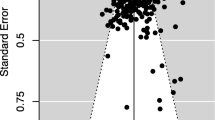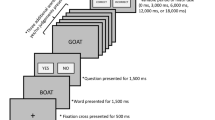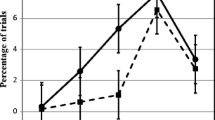Abstract
Thirty-four subjects performed a task which combined the running memory and ‘throughlist’ distractor paradigms and was designed to permit an echoic consolidation effect across all serial positions , The predicted long-term difference between reading aloud and reading silently was clearly demonstrated and the results were used to argue in support of the ‘indirect-echoic’ hypothesis.
Similar content being viewed by others
References
Bjork, R.A. & Whitten, W.B. (1974). Recency-sensitive retrieval processes. Cognitive Psychology, 6, 173–189.
Broadbent, D.E., Vines, R. & Broadbent, M.H.P. (1978). Recency effects in memory, as a function of modality of intervening events. Psychological Research, 40, 513.
Cleary, A. (1977). Instrumentation for Psychology. Chichester: Wiley.
Conrad, R. & Hull, A.J. (1968). Input modality and the serial position curve in short-term memory. Psychonomic Science, 10, 4, 135–136.
Crowder, R.G. (1970). The role of one's own voice in immediate memory. Cognitive Psychology, 1, 157–178.
Crowder, R.G. (1972). Visual and auditory memory. In J.F. Kavanaugh & I.G. Mattingly (eds.), Language by Ear and by Eye. Cambridge, Ma: MIT Press.
Crowder, R.G. & Morton, J. (1969). Precategorical acoustic storage (PAS). Perception and Psychophysics, 5, 365–373.
Gardiner, J.M. & Gregg, V.H. (1979). When auditory memory is not overwritten. Journal of Verbal Learning and Verbal Behavior, 18, 705–719.
Morton, J. (1970). A functional model for memory. In D.A. Norman (ed.), Models of Human Memory. New York: Academic Press.
Murdock, B.B. Jr & Walker, K.D. (1969). Modality effects in free recall. Journal of Verbal Learning and Verbal Behavior, 8, 665–676.
Murray, D.J. (1966). Vocalization at presentation and immediate recall, with varying recall methods. Quarterly Journal of Experimental Psychology, 18, 9–18.
Routh, D.A. (1976). An ‘across the board’ modality effect in immediate serial recall. Quarterly Journal of Experimental Psychology, 28, 285–304.
Routh, D. A. & Mayes, J. T. (1974a). On consolidation and the potency of delayed stimulus suffixes. Quarterly Journal of Experimental Psychology, 26, 472–479.
Routh, D.A. & Mayes, J.T. (1974b). A robust recency effect in delayed (ordered) recall. IRCS Medical Science: Psychology, 2, 1618.
Tzeng, O. J. L. (1973). Positive recency effect in a delayed free recall. Journal of Verbal Learning and Verbal Behavior, 12, 436–439.
Watkins, O.C. & Watkins, M.J. (1980). The modality effect and echoic persistence. Journal of Experimental Psychology: General, 109, 3, 251–278.
Author information
Authors and Affiliations
Rights and permissions
About this article
Cite this article
Mayes, J.T. The modality effect in long-term memory: a test of the echoic-consolidation hypothesis. Current Psychological Research 2, 203–206 (1982). https://doi.org/10.1007/BF03186761
Accepted:
Published:
Issue Date:
DOI: https://doi.org/10.1007/BF03186761




